2018新人教版八年级上册英语单元语法及知识点归纳
人教版八年级英语上册各单元知识要点

人教版八年级英语上册各单元知识要点Unit 1When is your birthday?1. 询问生日的方式:- When is your birthday?- My birthday is on (具体日期) + (月份) (ordinal numeral)th.- It's on the (具体日期) + (月份) (ordinal numeral)th.2. 表达年龄的方式:- How old are you?- I am (年龄) years old.Unit 2How often do you exercise?1. 表达频率的副词:- always 总是- often 经常- usually 通常- sometimes 有时候- rarely 很少- never 从不2. 频率副词在句子中的位置:- 常用于be动词、助动词或情态动词之后,行为动词之前。
Unit 3Why do you like koalas?1. 表达喜欢或不喜欢的方式:- Why do you like/don't like + 名词?- Because they are (形容词).- Because they are (形容词) + and (形容词).Unit 4What's the best movie theater?1. 表达最高级的方式:- What's + the + 形容词最高级 + 名词 (单数) ?- What's + the + most/least + 形容词 + 名词 (复数) ?Unit 5Do you want to watch a game show?1. 表达想要做某事的方式:- Do you want to + 动词原形 + 名词?- Sure./Yes, I do./No, I don't.2. 表达对某事感兴趣的方式:- Are you interested in + 名词/动名词?- Yes, I am./No, I'm not.Unit 6I'm going to study computer science.1. 表达将来计划、打算要做某事的方式:- I'm going to + 动词原形.- I'm + (具体时间) + going to + 动词原形.2. 表达将来计划、打算要做某事的原因:- Why are you going to + 动词原形?- Because + 原因.Unit 7Will people have robots?1. 表达将来会发生的事情:- Will + 主语 + 动词原形?- Yes, 主语 + will./No, 主语 + won't.2. 表达对将来的预测和想法:- I think + 将来的情况 + (will) + 结果.- Maybe + 将来的情况 + will + 结果.Unit 8How do you make a banana milk shake?1. 描述烹饪步骤的连词:首先,第一,接下来,然后,最后2. 描述烹饪步骤的动词:- peel 削皮- chop 切碎- blend 搅拌- pour 倒- mix 混合- serve 上菜Unit 9How was your weekend?1. 询问周末活动的方式:- How was your weekend?- What did you do on the weekend?2. 描述周末活动的过去式:- I (动词过去式) + (具体活动).Unit 10Where did you go on vacation? 1. 询问度假地点的方式:- Where did you go on vacation?- I went to (具体度假地点).2. 描述度假活动的过去式:- I (动词过去式) + (具体活动) on vacation.以上是人教版八年级英语上册各单元的知识要点,通过灵活运用这些表达方式和句型结构,可以更加流利地进行英语交流。
新人教版八年级上册英语知识点总结

新人教版八年级上册英语知识点总结
本文档总结了新人教版八年级上册英语的重要知识点。
一、基础语法知识
1. 时态和语态:包括一般现在时、一般过去时、一般将来时等常用时态,以及被动语态的构成和用法。
2. 名词:介绍了可数名词和不可数名词的区别,以及名词所有格的构成。
3. 代词:包括主格代词、宾格代词、形容词性物主代词和名词性物主代词的用法。
4. 形容词和副词:介绍了形容词和副词的比较级和最高级的构成规则,以及修饰方式的区别。
5. 介词:包括常用介词的用法和搭配,如in, on, at等。
6. 句子结构:主谓结构、主谓宾结构、并列句和复合句的构成和用法。
二、词汇与阅读技巧
1. 新词汇:列举了本册教材中出现的重要词汇,并给出了中文翻译和例句。
2. 阅读技巧:提供了阅读理解的技巧和方法,如快速阅读、略读和细读等。
三、听力技巧和口语表达
1. 听力技巧:介绍了有效提高听力理解能力的方法,包括听前预测、留意关键词等。
2. 口语表达:列举了常用口语表达,如问路、购物和介绍自己等。
四、写作技巧和语法点
1. 写作技巧:讲解了句子的结构和连接词的使用,以及一些常用写作句型和表达方式。
2. 语法点:解析了本册教材中出现的语法规则和用法,包括动词的时态和语态、名词的所有格等。
该文档总结了新人教版八年级上册英语的重要知识点,希望能对学生们的研究有所帮助。
(800字)。
人教版八年级英语上册知识点总结

人教版八年级英语上册知识点总结一、基本语法1.时态:英语时态分为以下几种:现在时、过去时、将来时。
每种时态又分为简单时态、进行时态、完成时态和完成进行时态等。
例如:–现在时:简单现在时: 主语 + 动词原形;进行现在时:主语 + be(am/is/are) + v-ing;完成现在时:主语 + have / has + 过去分词;完成进行现在时:主语 + have / has + been + v-ing。
–过去时:简单过去时:主语 + 动词过去式;进行过去时:主语 + was / were + v-ing;完成过去时:主语 + had + 过去分词;完成进行过去时:主语 + had + been + v-ing。
–将来时:简单将来时:主语 + will / shall + 动词原形;进行将来时:主语 + will / shall + be + v-ing;完成将来时:主语 + will / shall + have + 过去分词;完成进行将来时:主语 + will / shall + have + been + v-ing。
2.倒装句:倒装是指把谓语动词放在主语前面形成的一种语法现象。
如:Only in this way can we solve the problem. (只有这样才能解决问题。
) 倒装句句型格式为:_____+主语(名词或代词)+_____。
在不同的情况下需要用到不同的“辅助动词/助动词”来进行倒装。
3.被动语态:被动语态就是在句子中表达动作的承受者(即主语)的语态。
结构为:被(或受)动责任的动词(to be) + 过去分词。
如:The book was written by him.(这本书是由他写的。
)4.虚拟语气:虚拟语气是指在表示假设,愿望,建议等语气时所使用的一种语态形式。
其结构为:主语+should/could/might/would+(have)+动词原形。
如: If I were you, I would buy this dress(如果我是你,我会买这件衣服。
2018新人教版八年级上册英语单元语法及知识点归纳.docx

2018新人教版八年上册英元法及知点Unit1 Where did you go on vacation?【重点法】不定代:不指名代替任何特定名或形容的代叫做不定代。
用法注意:1. some和any +可数名/不可数名。
some 多用于肯定句,any 多用于否定句、疑句和条件从句。
有些句中用 some, 不用 any, 者希望得到方肯定回答。
2.由some, any, no, every与body, one, thing构成的复合不定代作主,其用三。
3.不定代若有定修,定要置于其后:如:something interesting【重点短】1. buy sth for ab./ buy sb. sth某人某物2.taste + adj.起来⋯⋯3.nothing...but + V.(原形)除了⋯⋯之外什么都没有4. seem + (to be) + adj看起来5. arrive in +大地方/ arrive at +小地方到达某地6. decide to do sth.决定做某事7. try doing sth.做某事/ try to do sth.尽力做某事8. enjoy doing sth.喜做某事9. want to do sth.想去做某事10. start doing sth.开始做某事=begin doing sth.11. stop doing sth.停止做某事区分:stop to do sth.停下来去做某事12. dislike doing sth.不喜做某事14. so + adj + that +从句如此⋯⋯以至于⋯⋯16. tell sb. (not) to do sth.告某人(不要)做某事17. keep doing sth.做某事18. forget to do sth.忘去做某事 / forget doing sth忘做某事【辨析】1. take a photo/ take photos拍照quite a few+名复数“ 多⋯”2. seem +形容看起来⋯...You seem happy today. seem + to do sth.似乎 / 好像做某事 I seem to have a coldIt seems +从句似乎 .. ⋯It.seems that no one believe you.seem like ...好像,似乎⋯ It.. seems like a good idea.3. arrive in +大地点 = get to= reach+地点名“到达 ......”arrive at +小地点(注:若后跟地点副 here/there/home,介需省略,如: arrive here; get home)4. feel like sth感像⋯feel doing sth.想要做某事5. wonder(想知道) + 疑( who, what, why)引的从句。
人教版八年级英语上册知识点总结和复习要点
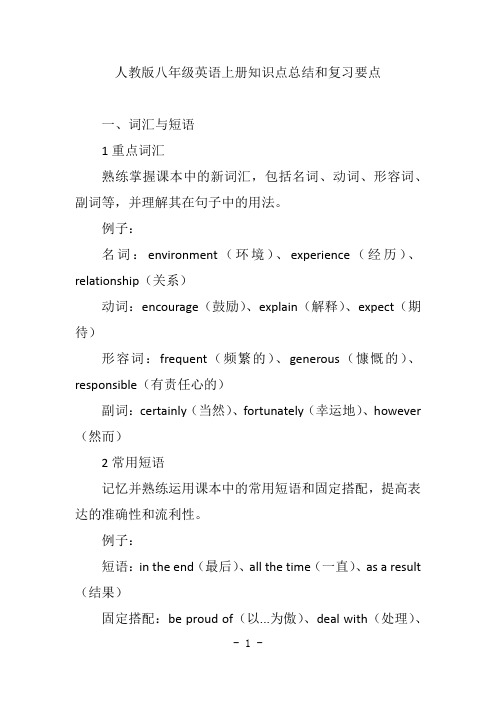
人教版八年级英语上册知识点总结和复习要点一、词汇与短语1重点词汇熟练掌握课本中的新词汇,包括名词、动词、形容词、副词等,并理解其在句子中的用法。
例子:名词:environment(环境)、experience(经历)、relationship(关系)动词:encourage(鼓励)、explain(解释)、expect(期待)形容词:frequent(频繁的)、generous(慷慨的)、responsible(有责任心的)副词:certainly(当然)、fortunately(幸运地)、however (然而)2常用短语记忆并熟练运用课本中的常用短语和固定搭配,提高表达的准确性和流利性。
例子:短语:in the end(最后)、all the time(一直)、as a result (结果)固定搭配:be proud of(以...为傲)、deal with(处理)、pay attention to(注意)二、句型与语法1基本句型熟练掌握五种基本句型,包括主语+谓语、主语+谓语+宾语、主语+谓语+间接宾语+直接宾语、主语+谓语+宾语+宾语补足语、主语+系动词+表语。
例子:主语+谓语:She sings.(她唱歌。
)主语+谓语+宾语:I like apples.(我喜欢苹果。
)主语+谓语+间接宾语+直接宾语:He gave me a book.(他给了我一本书。
)主语+谓语+宾语+宾语补足语:I found the book interesting.(我发现这本书很有趣。
)主语+系动词+表语:She is beautiful.(她很漂亮。
)2时态深入学习并掌握现在完成时、过去进行时、一般将来时、过去将来时等时态的用法和形式。
例子:现在完成时:I have already seen that movie.(我已经看过那部电影了。
)过去进行时:They were playing football when I called them.(我打电话给他们时,他们正在踢足球。
人教八年级英语上册语法
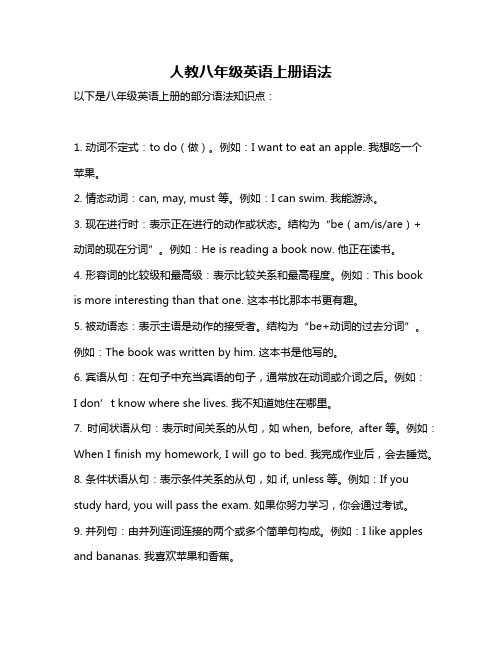
人教八年级英语上册语法以下是八年级英语上册的部分语法知识点:1. 动词不定式:to do(做)。
例如:I want to eat an apple. 我想吃一个苹果。
2. 情态动词:can, may, must 等。
例如:I can swim. 我能游泳。
3. 现在进行时:表示正在进行的动作或状态。
结构为“be(am/is/are)+动词的现在分词”。
例如:He is reading a book now. 他正在读书。
4. 形容词的比较级和最高级:表示比较关系和最高程度。
例如:This book is more interesting than that one. 这本书比那本书更有趣。
5. 被动语态:表示主语是动作的接受者。
结构为“be+动词的过去分词”。
例如:The book was written by him. 这本书是他写的。
6. 宾语从句:在句子中充当宾语的句子,通常放在动词或介词之后。
例如:I don’t know where she lives. 我不知道她住在哪里。
7. 时间状语从句:表示时间关系的从句,如when, before, after等。
例如:When I finish my homework, I will go to bed. 我完成作业后,会去睡觉。
8. 条件状语从句:表示条件关系的从句,如if, unless等。
例如:If you study hard, you will pass the exam. 如果你努力学习,你会通过考试。
9. 并列句:由并列连词连接的两个或多个简单句构成。
例如:I like apples and bananas. 我喜欢苹果和香蕉。
以上是部分语法知识点,建议咨询专业英语教师,获取更准确的信息。
八年级英语(人教版)上册重点语法知识点

八年级上册重点语法知识点1. 感叹句:感叹句是用来表达喜怒哀乐等强烈情感的句子。
感叹句一般用how或者what开头,句末加感叹号。
what修饰名词,how修饰形容词或副词。
具体句式如下:(1)what引导的感叹句:1)What a(an)+形容词+可数名词的单数形式+主语+谓语!What a clever boy he is!多么聪明的小男孩啊!2)What+形容词+可数名词的复数形式+主语+谓语!What interesting books the children are reading! 孩子们读的书多么有趣啊!3)What+形容词+不可数名词+主语+谓语!What cold weather it is!多冷的天!(2)how引导的感叹句:1)How+形容词或副词+主语+谓语!How lovely the baby is!这孩子真可爱!(lovely为形容词)How fast he runs! 他跑地多快啊!(fast为副词)2)How+形容词+a(an)+可数名词的单数形式+主语+谓语!How heavy a box they are carrying! 他们抬的箱子多重啊!3)How+主语+谓语!How time flies! 时间过得多快!( ) 1. interesting job this is!A.WhatB.HowC.What anD.How an( ) 2. Mo Yan won the Nobel Prize for Literature last year. _______excellent he is!A. HowB. WhatC. What aD. What an( ) 3. ---______day it is!--- Let’s go out and enjoy the sunshine!A. What a lovelyB. How windyC. What a rainyD. How lovely( ) 4. ______ terrible weather we had last Sunday!A. WhatB. What aC.HowD. How a( ) 5. ______useful the book is! We can know well about the city from it.A. WhatB. What aC. HowD. What an( ) 6. _____great picture! Who painted it?A. HowB. WhatC. How aD. What a( ) 7. ______ a beautiful car! I’ve never seen it before.A. WhatB. WhichC.HowD.Whether2. How oftenhow often意为“多久一次”,常用于对时间频率的提问。
2018人教八年级上英语第二单元sectionB知识点总结
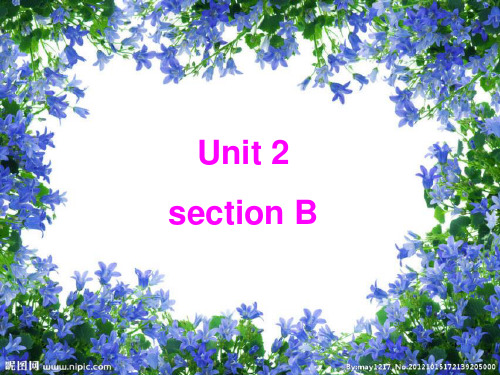
6. percet 百分之…… (无复数形式) a). 基数词 + percent
eg: 30% thirty percent 100% one hundred percent
b). 做主语时,根据他所修饰的名词来判断 谓语的单复数。
Eg: 40%的学生是女生。
Fourty percet of studets are girls. 30%的时间过去了。 Thirty percent of time passes.
5.Here are the results. 这是(调查)结果。 Here 位于句首,句子要倒装。 Here is + 单数名词。 Here are + 复数名词
a). 如果主语是名词,须完全倒装。 Here is a letter for you. 这儿有一封信给你。 b).如果主语是代词,须用部分倒装。
none 与no one, nobody 的用法区别
no one=nobody,两者均只能指人,作主语时, 谓语动词一般用单数。
none 暗示一种数量,“一个也没有” 而 no one 或 nobody 指“谁都没有” 回答 how many 或 how much 的提问时,通常用 none 而在回答 who 的提问时,通常用 no one 或 nobody。
Unit 2 section B
1. My mother wants me to drink it.
Want sb to do sth 想让某人做某事
want sth
想要某物
want to do sth
想(要)做某事
Eg : 我想让我的爸爸和我去玩。
I want my father to play with me.
八年级上册英语单元语法及知识点归纳
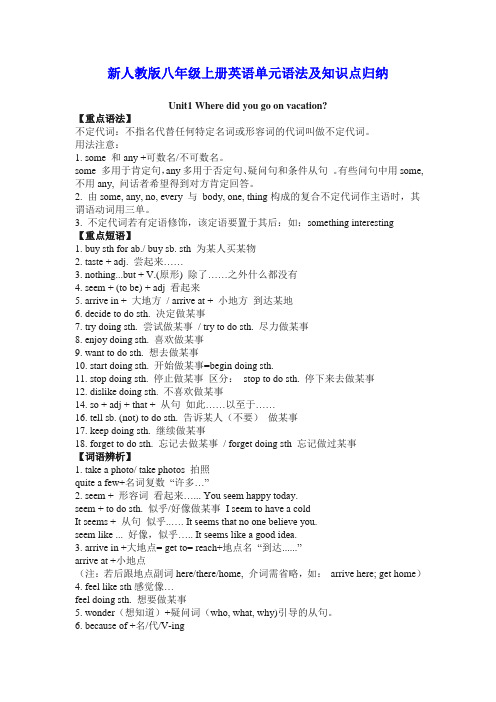
新人教版八年级上册英语单元语法及知识点归纳Unit1 Where did you go on vacation?【重点语法】不定代词:不指名代替任何特定名词或形容词的代词叫做不定代词。
用法注意:1. some 和any +可数名/不可数名。
some 多用于肯定句,any多用于否定句、疑问句和条件从句。
有些问句中用some,不用any, 问话者希望得到对方肯定回答。
2. 由some, any, no, every 与body, one, thing构成的复合不定代词作主语时,其谓语动词用三单。
3. 不定代词若有定语修饰,该定语要置于其后:如:something interesting【重点短语】1. buy sth for ab./ buy sb. sth 为某人买某物2. taste + adj. 尝起来……3. nothing...but + V.(原形) 除了……之外什么都没有4. seem + (to be) + adj 看起来5. arrive in + 大地方/ arrive at + 小地方到达某地6. decide to do sth. 决定做某事7. try doing sth. 尝试做某事/ try to do sth. 尽力做某事8. enjoy doing sth. 喜欢做某事9. want to do sth. 想去做某事10. start doing sth. 开始做某事=begin doing sth.11. stop doing sth. 停止做某事区分:stop to do sth. 停下来去做某事12. dislike doing sth. 不喜欢做某事14. so + adj + that + 从句如此……以至于……16. tell sb. (not) to do sth. 告诉某人(不要)做某事17. keep doing sth. 继续做某事18. forget to do sth. 忘记去做某事/ forget doing sth 忘记做过某事【词语辨析】1. take a photo/ take photos 拍照quite a few+名词复数“许多…”2. seem + 形容词看起来…... You seem happy today.seem + to do sth. 似乎/好像做某事I seem to have a coldIt seems + 从句似乎..…. It seems that no one believe you.seem like ... 好像,似乎….. It seems like a good idea.3. arrive in +大地点= get to= reach+地点名“到达......”arrive at +小地点(注:若后跟地点副词here/there/home, 介词需省略,如:arrive here; get home)4. feel like sth 感觉像…feel doing sth. 想要做某事5. wonder(想知道)+疑问词(who, what, why)引导的从句。
新人教版八年级上册英语单元语法及知识点归纳.docx
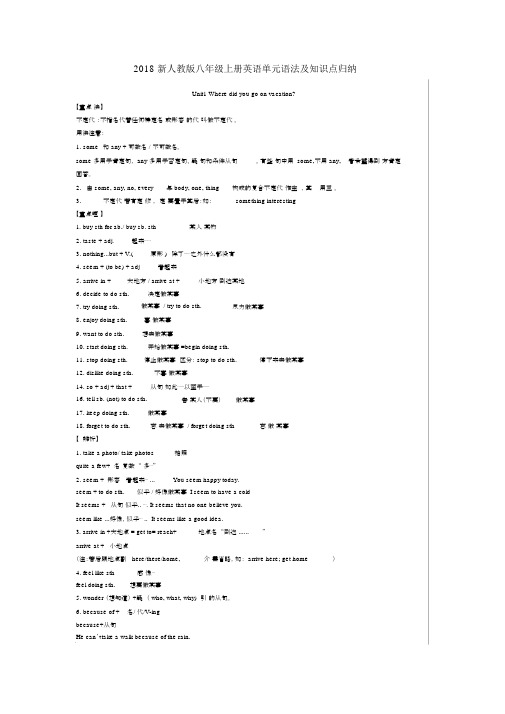
2018 新人教版八年级上册英语单元语法及知识点归纳Unit1 Where did you go on vacation?【重点法】不定代:不指名代替任何特定名或形容的代叫做不定代。
用法注意:1. some和any +可数名/不可数名。
some 多用于肯定句, any 多用于否定句、疑句和条件从句。
有些句中用 some,不用 any, 者希望得到方肯定回答。
2.由 some, any, no, every与 body, one, thing构成的复合不定代作主,其用三。
3.不定代若有定修,定要置于其后:如:something interesting【重点短】1. buy sth for ab./ buy sb. sth某人某物2. taste + adj.起来⋯⋯3. nothing...but + V.(原形 )除了⋯⋯之外什么都没有4. seem + (to be) + adj看起来5. arrive in +大地方 / arrive at +小地方到达某地6. decide to do sth.决定做某事7. try doing sth.做某事 / try to do sth.尽力做某事8. enjoy doing sth.喜做某事9. want to do sth.想去做某事10. start doing sth.开始做某事 =begin doing sth.11. stop doing sth.停止做某事区分: stop to do sth.停下来去做某事12. dislike doing sth.不喜做某事14. so + adj + that +从句如此⋯⋯以至于⋯⋯16. tell sb. (not) to do sth.告某人(不要)做某事17. keep doing sth.做某事18. forget to do sth.忘去做某事 / forget doing sth忘做某事【辨析】1. take a photo/ take photos拍照quite a few+ 名复数“ 多⋯”2. seem + 形容看起来⋯ ...You seem happy today.seem + to do sth.似乎 / 好像做某事 I seem to have a coldIt seems + 从句似乎.. ⋯. It seems that no one believe you.seem like ...好像,似乎⋯.. It seems like a good idea.3. arrive in +大地点= get to= reach+地点名“到达 ......”arrive at + 小地点(注:若后跟地点副 here/there/home,介需省略,如: arrive here; get home)4. feel like sth感像⋯feel doing sth.想要做某事5. wonder (想知道) +疑( who, what, why) 引的从句。
初中英语人教版八年级上册重点知识整理(1~3单元)

八年级英语上册重点知识整理Unit1 Where did you go on vacation?【重点语法】不定代词:不指名代替任何特定名词或形容词的代词叫做不定代词。
用法注意:1、some 和any+可数名/不可数名。
some 多用于肯定句,any多用于否定句、疑问句和条件从句。
有些问句中用some,不用any, 问话者希望得到对方肯定回答。
2、由some, any, no,every 与 body, one, thing构成的复合不定代词作主语时,其谓语动词用三单。
3、不定代词若有定语修饰,该定语要置于其后:如:something interesting【重点短语】1.buy sth for ab./ buy sb.sth 为某人买某物2.taste + adj.尝起来……3.nothing...but + V.(原形) 除了……之外什么都没有4.seem + (to be) + adj 看起来5.arrive in + 大地方 / arrive at + 小地方到达某地6.decide to do sth.决定做某事7.try doing sth.尝试做某事 / try to do sth.尽力做某事8.enjoy doing sth.喜欢做某事9.want to do sth.想去做某事10.start doing sth.开始做某事/ begin doing sth.11.stop doing sth.停止做某事区分:stop to do sth.停下来去做某事12.dislike doing sth.不喜欢做某事14.so + adj + that + 从句如此……以至于……16.tell sb.(not) to do sth.告诉某人(不要)做某事17.keep doing sth. 继续做某事18.forget to do sth.忘记去做某事 / forget doing sth 忘记做过某事【词语辨析】1.take a photo/ take photos 拍照2.seem + 形容词看起来…seem + to do sth.似乎/好像做某事It seems + 从句似乎..….It seems that no>seem like ...好像,似乎…3.arrive in +大地点= get to= reach+地点名“到达......”arrive at +小地点(注:若后跟地点副词here/there/home, 介词需省略,如:arrive here; get home)4.feel like sth 感觉像…feel doing sth.想要做某事5.wonder(想知道)+疑问词(who, what, why)引导的从句。
新人教版八年级上册英语单元语法及知识点归纳

新人教版八年级上册英语单元语法及知识点归纳Unit1 Where did you go on vacation?【重点语法】不定代词:不指名代替任何特定名词或形容词的代词叫做不定代词。
用法注意:1. some 和any +可数名/不可数名。
some 多用于肯定句,any多用于否定句、疑问句和条件从句。
有些问句中用some,不用any, 问话者希望得到对方肯定回答。
2. 由some, any, no, every 与body, one, thing构成的复合不定代词作主语时,其谓语动词用三单。
3. 不定代词若有定语修饰,该定语要置于其后:如:something interesting【重点短语】1. buy sth for ab./ buy sb. sth 为某人买某物2. taste + adj. 尝起来……3. nothing...but + V.(原形) 除了……之外什么都没有4. seem + (to be) + adj 看起来5. arrive in + 大地方/ arrive at + 小地方到达某地6. decide to do sth. 决定做某事7. try doing sth. 尝试做某事/ try to do sth. 尽力做某事8. enjoy doing sth. 喜欢做某事9. want to do sth. 想去做某事10. start doing sth. 开始做某事=begin doing sth.11. stop doing sth. 停止做某事区分:stop to do sth. 停下来去做某事12. dislike doing sth. 不喜欢做某事14. so + adj + that + 从句如此……以至于……16. tell sb. (not) to do sth. 告诉某人(不要)做某事17. keep doing sth. 继续做某事18. forget to do sth. 忘记去做某事/ forget doing sth 忘记做过某事【词语辨析】1. take a photo/ take photos 拍照quite a few+名词复数“许多…”2. seem + 形容词看起来…... You seem happy today.seem + to do sth. 似乎/好像做某事I seem to have a coldIt seems + 从句似乎..…. It seems that no one believe you.seem like ... 好像,似乎….. It seems like a good idea.3. arrive in +大地点= get to= reach+地点名“到达......”arrive at +小地点(注:若后跟地点副词here/there/home, 介词需省略,如:arrive here; get home)4. feel like sth 感觉像…feel doing sth. 想要做某事5. wonder(想知道)+疑问词(who, what, why)引导的从句。
八年级上册英语知识点归纳总结人教版
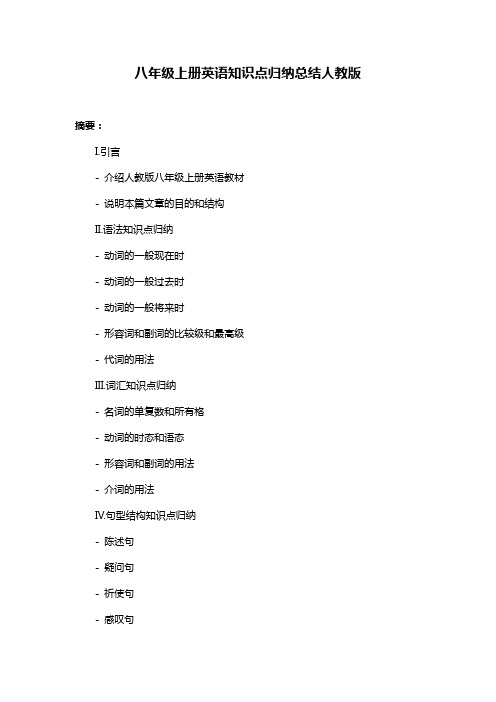
八年级上册英语知识点归纳总结人教版摘要:I.引言- 介绍人教版八年级上册英语教材- 说明本篇文章的目的和结构II.语法知识点归纳- 动词的一般现在时- 动词的一般过去时- 动词的一般将来时- 形容词和副词的比较级和最高级- 代词的用法III.词汇知识点归纳- 名词的单复数和所有格- 动词的时态和语态- 形容词和副词的用法- 介词的用法IV.句型结构知识点归纳- 陈述句- 疑问句- 祈使句- 感叹句V.听力技巧- 提高听力水平的策略- 常见听力题型和解题技巧VI.口语技巧- 日常口语表达- 口语交际技巧VII.总结- 强调学习英语的重要性- 鼓励学生积极参与英语学习活动正文:人教版八年级上册英语教材是初中英语学习的重要阶段,涉及到许多重要的语法、词汇和句型结构知识点。
为了帮助学生更好地掌握这些知识点,本文将对其进行归纳总结。
首先,语法方面,我们学习了动词的一般现在时、一般过去时和一般将来时,这些时态有助于描述动作的发生时间和方式。
此外,我们还学习了形容词和副词的比较级和最高级,以及代词的用法,这些知识点可以帮助我们更准确地表达事物之间的关系。
其次,词汇方面,我们学习了名词的单复数和所有格,以及动词的时态和语态。
这些知识点可以帮助我们正确地选择词汇,避免在表达时出现错误。
此外,我们还学习了形容词和副词的用法,以及介词的用法,这些知识点可以帮助我们更好地描述事物特征和空间关系。
在句型结构方面,我们学习了陈述句、疑问句、祈使句和感叹句等不同类型的句子。
这些句型结构有助于我们更灵活地进行表达,满足不同的交际需求。
此外,我们还学习了提高听力水平的策略,以及常见听力题型和解题技巧。
通过不断地练习和积累,我们可以提高英语听力水平,更好地理解和应用英语知识。
在口语方面,我们学习了日常口语表达和口语交际技巧。
这些技巧可以帮助我们更好地与他人进行英语交流,提高我们的英语口语水平。
总之,学习英语是非常重要的,我们应该积极参与英语学习活动,努力提高自己的英语水平。
新人教版八年级上册英语单元语法及知识点整理

新人教版八年级上册英语单元语法及知识点整理Unit 1 - How do you study for a test?Grammar- Present Simple Tense Present Simple Tense- Used to express habits or routines- Example: I usually study for tests by making flashcards.- Present Continuous Tense Present Continuous Tense- Used to express actions happening at the moment of speaking- Example: I am studying for my English test right now. Knowledge Points- Adverbs of Frequency Adverbs of Frequency- Used to talk about how often something happens- Example: I always review my notes before a test.Unit 2 - What's the matter?Grammar- Subject-Verb Agreement Subject-Verb Agreement- Singular subjects require singular verbs and plural subjects require plural verbs- Example: He has a headache. They have headaches.Knowledge Points- Health Problems and Symptoms Vocabulary Health Problems and Symptoms Vocabulary- Example: headache, fever, sore throat, etc.Unit 3 - Where did you go?Grammar- Past Simple Tense Past Simple Tense- Example: I visited my grandparents last weekend.Knowledge Points- Vocabulary for Places Vocabulary for Places- Words and phrases related to different locations- Example: museum, park, restaurant, etc.Unit 4 - Don't eat in class.Grammar- Imperative Sentences Imperative Sentences- Example: Don't talk during the exam.Knowledge Points- Classroom Rules and Guidelines Classroom Rules and Guidelines- Vocabulary and phrases related to behavior in the classroom - Example: raise your hand, be quiet, pay attention, etc.Unit 5 - Why do you like pandas?Grammar- Questions with "Why"Questions with "Why"- Used to ask for reasons or explanations- Example: Why do you like playing basketball? Knowledge Points- Animal Vocabulary Animal Vocabulary- Words and phrases related to different types of animals- Example: lion, tiger, panda, etc.。
新人教版八年级上册英语单元语法及知识点总结概览
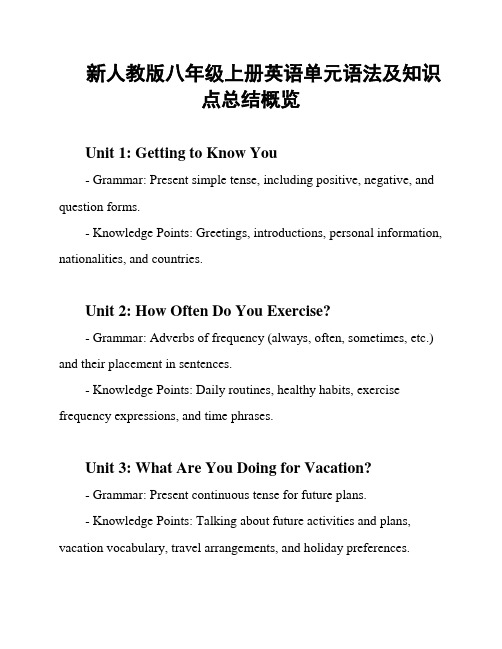
新人教版八年级上册英语单元语法及知识点总结概览Unit 1: Getting to Know You- Grammar: Present simple tense, including positive, negative, and question forms.- Knowledge Points: Greetings, introductions, personal information, nationalities, and countries.Unit 2: How Often Do You Exercise?- Grammar: Adverbs of frequency (always, often, sometimes, etc.) and their placement in sentences.- Knowledge Points: Daily routines, healthy habits, exercise frequency expressions, and time phrases.Unit 3: What Are You Doing for Vacation?- Grammar: Present continuous tense for future plans.- Knowledge Points: Talking about future activities and plans, vacation vocabulary, travel arrangements, and holiday preferences.Unit 4: What's the Best Movie Theater?Unit 5: Do You Want to Watch a Game Show?- Grammar: Modal verbs (can, could, may, might) for permission, possibility, and requests.- Knowledge Points: Television programs, preferences, making suggestions, and asking for permission.- Grammar: Going to future tense for predictions, plans, and intentions.- Knowledge Points: Talking about future aspirations, college majors, career goals, and future plans.Unit 7: Will People Have Robots?- Grammar: Future simple tense for predictions and offers.- Knowledge Points: Discussing technological advancements, future predictions, future inventions, and making offers.Unit 8: How Do You Make a Banana Milk Shake?- Grammar: Imperative sentences for giving instructions.- Knowledge Points: Recipes, food and drink vocabulary, giving instructions, and sequencing steps.Unit 9: I Like Music That I Can Dance To.- Grammar: Relative clauses (defining and non-defining) to provide additional information about nouns.- Knowledge Points: Music and dance preferences, describing things, people or places, and using relative clauses.Unit 10: How Much Are These Earrings?- Grammar: Countable and uncountable nouns, and quantifiers (some, any, much, many, a lot of, etc.)- Knowledge Points: Shopping, prices, asking and talking about quantities, and using quantifiers in sentences.Unit 11: Can You Play the Guitar?- Grammar: Present simple tense for habits and abilities.- Knowledge Points: Musical instruments, abilities, hobbies, and talking about habits and routines.Unit 12: What's the Best Radio Station?Unit 13: My Third Video Audition- Grammar: Past simple tense of regular and irregular verbs.- Knowledge Points: Talents, skills, past experiences, talking about activities or events in the past, and asking others about their past experiences.- Grammar: Review of the grammar and knowledge points covered in Units 1-13.Unit 15: Book and Souvenir Sales- Grammar: Expressing preferences using 'would rather' and'prefer.'- Knowledge Points: Shopping for books and souvenirs, expressing preferences, and making choices.。
人教版八年级上册英语语法知识点
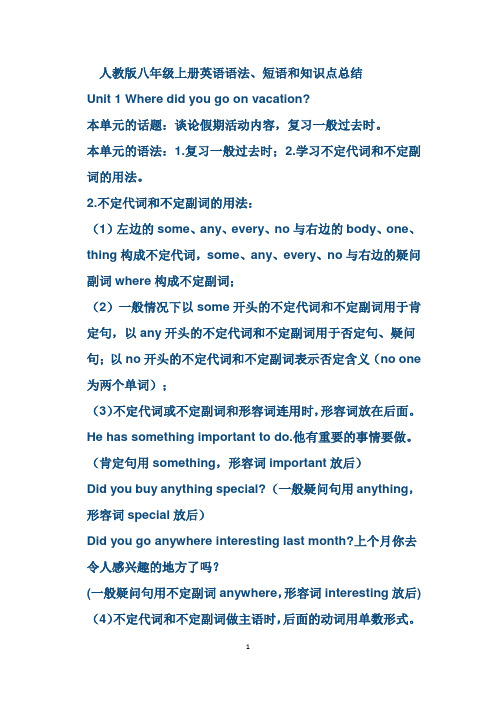
人教版八年级上册英语语法、短语和知识点总结Unit 1 Where did you go on vacation?本单元的话题:谈论假期活动内容,复习一般过去时。
本单元的语法:1.复习一般过去时;2.学习不定代词和不定副词的用法。
2.不定代词和不定副词的用法:(1)左边的some、any、every、no与右边的body、one、thing构成不定代词,some、any、every、no与右边的疑问副词where构成不定副词;(2)一般情况下以some开头的不定代词和不定副词用于肯定句,以any开头的不定代词和不定副词用于否定句、疑问句;以no开头的不定代词和不定副词表示否定含义(no one 为两个单词);(3)不定代词或不定副词和形容词连用时,形容词放在后面。
He has something important to do.他有重要的事情要做。
(肯定句用something,形容词important放后)Did you buy anything special? (一般疑问句用anything,形容词special放后)Did you go anywhere interesting last month?上个月你去令人感兴趣的地方了吗?(一般疑问句用不定副词anywhere,形容词interesting放后) (4)不定代词和不定副词做主语时,后面的动词用单数形式。
Everone is here today.今天每个人都在这里。
本单元的短语和知识点:1. go on vacation去度假go to the mountains 上山/进山2.stay at home呆在家go to the beach去海滩visit museums 参观博物馆go to summer camp去参观夏令营 3. study for tests为考试而学习\备考go out出去4. quite a few相当多,不少(后跟可数名词复数)take photos 照相most of the time大部分时间 5.buy sth for sb = buy sb sth为某人买某物 6. taste good. 尝起来很好taste(尝起来)、look(看起来)、sound(听起来)为感官动词,后跟形容词7.have a good\great\fun time过得高兴,玩得愉快(=enjoy oneself)8. go shopping去购物9. nothing…but+动词原形:除了……之外什么都没有He had nothing to do at home but read yesterday.昨天他在家除了读书无事可做。
- 1、下载文档前请自行甄别文档内容的完整性,平台不提供额外的编辑、内容补充、找答案等附加服务。
- 2、"仅部分预览"的文档,不可在线预览部分如存在完整性等问题,可反馈申请退款(可完整预览的文档不适用该条件!)。
- 3、如文档侵犯您的权益,请联系客服反馈,我们会尽快为您处理(人工客服工作时间:9:00-18:30)。
2018新人教版八年级上册英语单元语法及知识点归纳Unit1 Where did you go on vacation?【重点语法】不定代词:不指名代替任何特定名词或形容词的代词叫做不定代词。
用法注意:1. some 和any +可数名/不可数名。
some 多用于肯定句,any多用于否定句、疑问句和条件从句。
有些问句中用some,不用any, 问话者希望得到对方肯定回答。
2. 由some, any, no, every 与 body, one, thing构成的复合不定代词作主语时,其谓语动词用三单。
3. 不定代词若有定语修饰,该定语要置于其后:如:something interesting【重点短语】1. buy sth for ab./ buy sb. sth 为某人买某物2. taste + adj. 尝起来……3. nothing...but + V.(原形) 除了……之外什么都没有4. seem + (to be) + adj 看起来5. arrive in + 大地方 / arrive at + 小地方到达某地6. decide to do sth. 决定做某事7. try doing sth. 尝试做某事 / try to do sth. 尽力做某事8. enjoy doing sth. 喜欢做某事9. want to do sth. 想去做某事10. start doing sth. 开始做某事=begin doing sth.11. stop doing sth. 停止做某事区分: stop to do sth. 停下来去做某事12. dislike doing sth. 不喜欢做某事14. so + adj + that + 从句如此……以至于……16. tell sb. (not) to do sth. 告诉某人(不要)做某事17. keep doing sth. 继续做某事18. forget to do sth. 忘记去做某事 / forget doing sth 忘记做过某事【词语辨析】1. take a photo/ take photos 拍照quite a few+名词复数“许多…”2. seem + 形容词看起来…... You seem happy today.seem + to do sth. 似乎/好像做某事 I seem to have a coldIt seems + 从句似乎..…. It seems that no one believe you.seem like ... 好像,似乎….. It seems like a good idea.3. arrive in +大地点= get to= reach+地点名“到达......”arrive at +小地点(注:若后跟地点副词here/there/home, 介词需省略,如: arrive here; get home)4. feel like sth 感觉像…feel doing sth. 想要做某事5. wonder(想知道)+疑问词(who, what, why)引导的从句。
6. because of +名/代/V-ingbecause+从句He can’t take a walk because of the rain.I don’t buy the shirt because it was too expensive.7. enough +名词足够的…...形容词/副词+enoughUnit2 How often do you exercise?【重点语法】1. 频率副词: always, usually, often, sometimes, never频率副词在句中通常放在实义动词之前, be动词或助动词之后。
常用于一般现在时态中。
2.“次数”的表达方法一次 once,两次twice,三次或三次以上:基数词+ times, 如:three times, five times,3. how often“多久一次”问频率,回答常含有频率词组或短语。
常见的how疑问词:1)How soon 多久(以后)—How soon will he be back?他多久能回来?—He will be back in a month. 他一个月后能回来。
2)how long “多久”—How long did it take you to clean the house? 你打扫房子用了多久?—It took me half an hour to clean the house. 我打扫这房子用了半小时。
3)How many+名复How much+不可名“多少”问数量(how much 还可问价格)【重点短语】1. go to the movies 去看电影2. look after = take care of 照顾3. surf the internet 上网4. healthy lifestyle 健康的生活方式5. go skate boarding 去划板6. keep healthy=stay healthy 保持健康7. eating habits 饮食习惯8. take more exercise 做更多的运动9. the same as 与什么相同10. be different from 不同11. once a month一月一次12. twice a week一周两次13.make a difference to 对......有影响/作用14. most of the students=most students15. shop=go shopping=do some shopping 购物16. be good for 对......有益17. be bad for 对......有害18. come home from school放学回家19. of course = certainly = sure 当然20. get good grades 取得好成绩21. keep/be in good health 保持健康22. take a vacation 去度假【词语辨析】1. maybe / may bemaybe 是副词,意为“大概,可能,或许”,一般用于句首。
May be是情态动词,意为“可能是...,也许是...,大概是...”.The baby is crying. Maybe she is hungry.The woman may be a teacher.2. a few / few / a little / littlea few (少数的,几个,一些) a little (一点儿,少量)表示肯定few (很少的,几乎没有的)little (很少的,几乎没有的)表示否定修饰可数名词修饰不可数名词People can live to 100, but few people can live to 150.There is little time left. I won’t catch the first bus.Could you give me a little milk?3. hard / hardlyhard作形容词,意为“困难的,艰苦的,硬的”;作副词,意为“努力地,猛烈地”。
hardly为副词,意为“几乎不”。
The ground is too hard to dig.I can hardly understand them.It’s raining hard. The people can hardly go outside.4. As for homework , most students do homework every day .as for...意思是“至于;关于”,+名词、代词或动词的-ing形式(即动名词)。
如: As for him,I never want to see him here.至于他,我永远不希望在这里见到。
As for the story,you'd better not believe it.关于那故事,你最好不要相信。
5. That sounds interesting.这是“主语+系动词+表语”结构的简单句。
sound(听起来),look(看起来),smell(闻起来),taste(尝起来),feel(觉得),seem (好象),grow(变得),get(变得)等词在英语中可用作系动词,后跟形容词作表语。
如:It tastes good. 这味道好。
The music sounds very sweet. 这音乐听起来很入耳。
The smoke grew heavier and heavier. 烟雾变得越来越浓了。
6. percent 名词,意为“百分之……”百分数的表示方法:基数+ percent (不用复数形式),percent做主语时,谓语动词的数要根据其后面的名词来确定。
50%:fifty percent百分之五十Fifty percent of the apples are bad. 50%的苹果都坏了。
Twenty percent of the meat is in the fridge. 20%的肉都在冰箱7. not… at all 意为“一点也不”,not应放在be动词、情态动词或助动词之后。
The story isn’t interesting at all. 那个故事一点也没有趣。
8. It is + adj. to do sth. 做某事是……的。
It is interesting to play computer games. 玩电脑很有趣。
9. take, spend, payIt takes sb. some time to do sth. 意为“花费某人……时间来做某事”。
人(sb.) spend 时间/钱 on sth. “买某物花了……钱”。
人(sb.) spend 时间/钱 (in) doing“花费多少时间来做某事”。
pay 的主语必须是人,而“花钱买某物”为pay...for...10. however 副词,意为“然而,可是”,表示转折关系,可放在句首、句中、句末。
Unit3 I’m more outgoing than my sister.【重点语法】1. 形容词和副词的比较等级(1)形容词和副词的原形就是原级(2)比较级,表示较……或更……(3)最高级,表示最...。
2. 比较级句型:(1)A + be动词+形容词的比较级+than +B “A比B更……”(注意:A与B必须是同级的,即必须是人与人,物与物进行对比)(2)“A+实意动词+副词比较级+ than + B”表示“A比B…”(3)比较A ,B两人/两事物问其中哪一个较…...时用句型:“Who/which +谓语动词+ adj./adv.比较级,A or B ?”Who is thinner, Jenny or Mary?3. 比较级的特殊用法(1)“比较级+and+比较级”,意为“越来越”。
